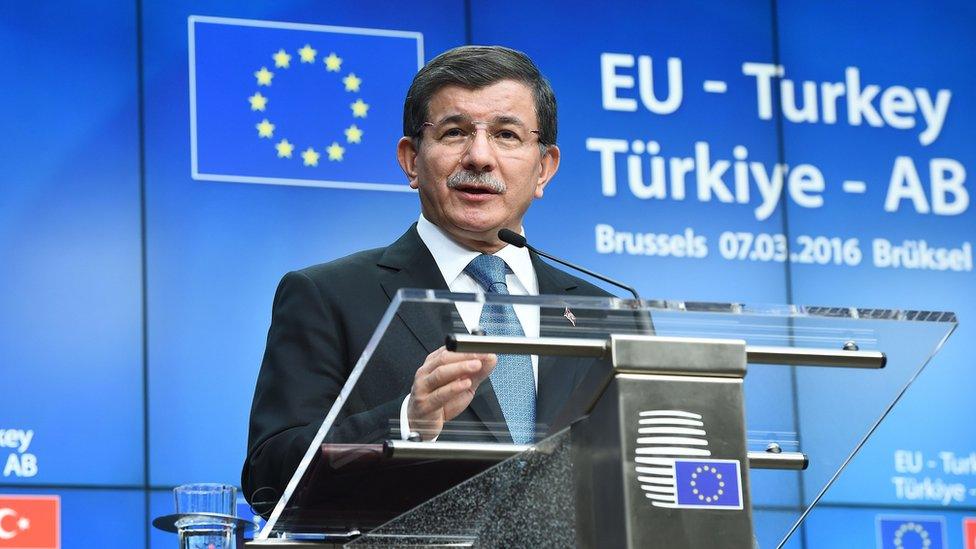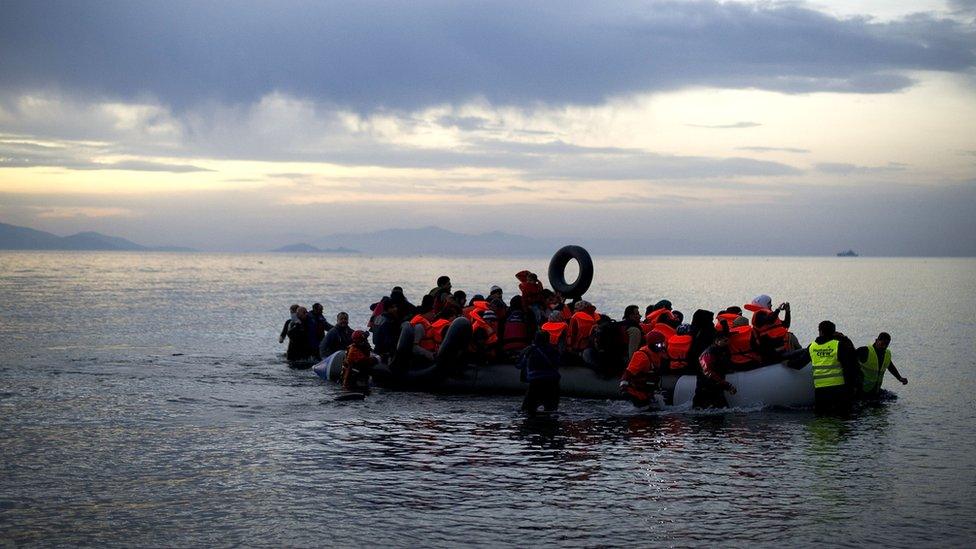Reality Check: How soon can Turkey join the EU?
- Published

Right now, the European Union and Turkey need each other. Officials in Brussels (crucially backed by Germany's Angela Merkel) argue that Ankara holds the key to solving the migration crisis.
More than a million people arrived on Europe's shores illegally last year, most travelling by boat from Turkey to Greece. Turkey needs EU money to deal with nearly three million, mainly Syrian, refugees already in the country.
But Turkey also sees this moment as a crucial step on its road to a long-term prize: membership of the European Union. That has opened a new front in Britain's referendum debate.
Campaigners for Brexit claim the brake on Turkey's tortuous EU accession talks will now be lifted and 75 million Turks will soon be free to live and work in the EU. But the government says that is nonsense. So who is right?
What's the plan?
First, let's look at the proposals discussed by EU leaders earlier this month and likely to be agreed in some form in Brussels this week.
Under the plan, all migrants arriving in Greece would be sent back to Turkey. For each Syrian sent back, a Syrian already in Turkey would be resettled in the EU, but only in countries that voluntarily take part in the resettlement scheme.
In return, the EU would aim to lift visa requirements for Turkish citizens by June 2016 (but this would not apply to the UK). The payment of €3bn (£2.4bn) to Turkey would be sped up, and preparations would be made for opening the next stage of talks on EU membership for Turkey.
All of this is complicated. For visa liberalisation to happen, Turkey has to meet 72 benchmarks on everything from biometric passports to judicial cooperation. Several EU leaders - Francois Hollande among them - have also insisted that there can be no short-cuts for Turkey; it has to fulfil all the criteria before visa-free travel to countries in the Schengen area can begin.

'Very sceptical'
"What is the alternative?" asked an exasperated Franz Timmermans, vice president of the EU Commission on the eve of this summit. "Irregular migration flows across the Aegean must stop," he told reporters.
But despite the inducements on the table, Mr Timmermans insisted, "we are not giving Turkey a free ride." That is the concern in much of the EU. In a European Parliament debate to discuss the plans, MEPs from left to right and north to south, criticised the EU's latest entanglement with Turkey.
"Stop Turkish accession", demanded a Dutch MEP. The head of the largest group in the European Parliament, the EPP's Manfred Weber, said: "my group is very sceptical as regards full membership of Turkey. We don't think that's a good idea for either side."
Ukip's leader Nigel Farage said the EU was being "blackmailed" by Turkey. Bringing the argument right back to the UK referendum, he said a vote for remaining in the EU, was "a vote for Turkey... for massively increased migration to Britain".
Knowing its resonance in the referendum campaign, Chancellor George Osborne sought to quash the idea Turkey could soon join the club. "I don't frankly think Turkish accession is on the cards any time soon," Mr Osborne said on 13 March. "We could, if we wanted to, veto it as other countries could", he said.

Still far off
But the UK government's formal position is to support Turkey joining the EU and over the years it has sounded enthusiastic. In July 2010, on a visit to Turkey, David Cameron warned France and Germany not to shut Turkey "out of the club". In reality, however, Turkey's membership of the EU still feels far off. Why?
For a start, it is very difficult for would-be members to clear all the hurdles required. A country has to adopt and enforce all the current EU rules before it can be admitted to the bloc. EU rules are divided into 35 policy areas and in 10 years Turkey only managed to adopt the rules on one: science and research. In most other areas it has not even made a start.
The European Commission has said it is prepared to look at further areas of talks with Turkey (on economic and monetary policy and the rule of law, among others) but that would need the agreement of EU member states to happen.
A 2015 Commission report on Turkey, external highlighted many areas of difficulty. These include concerns about Turkey's human rights record, new limits to freedom of expression and its state of public administration.
Perhaps most importantly, the Commission said there had been "no progress on normalising bilateral relations with the Republic of Cyprus". Turkey is the only country that recognises the self-declared Turkish Republic of Northern Cyprus. The EU and the United Nations only recognise the Greek Cypriot government as the legitimate government of the whole island.
'Not on the agenda'
After a candidate country and the EU complete their negotiations, all member states have to sign an accession treaty. It must then be approved by the European Parliament and be ratified by the parliaments of all existing EU states. Only then can a new country join the EU.
It took Croatia, Poland and Hungary 10 years to complete the process and Turkey is a far more controversial would-be member. Turkey applied to join what was then the European Economic Community in 1987. It then waited 10 years to be declared "eligible" for accession talks, which finally started in October 2005.
Progress on the technical talks has been demonstrably slow, but more significantly there is no sign of momentum within the EU to bring Turkey in. With populist parties doing well in several countries and fears about migration dominating politics across the EU, leaders are not trumpeting Turkey's case for membership. On 16 March, Chancellor Angela Merkel said Turkey's bid to join the EU was "really not on the agenda now".
Nigel Farage is right to say Turkey is lined up to join the EU one day. But the European Commission has said no new country will join within the next five years. And despite the EU's need for Ankara's help now and the sweeteners on offer, Turkey's membership of the EU could be at least another decade away.
Furthermore, support within Turkey for joining the EU has fallen significantly in recent years. Even if in the long term it agreed to all the EU's demands and adopted all its standards and policies, Turkey could still decide not to join the club.


READ MORE: The truth behind claims in the EU debate

- Published17 March 2016

- Published17 March 2016
- Published8 March 2016
- Published4 March 2016
